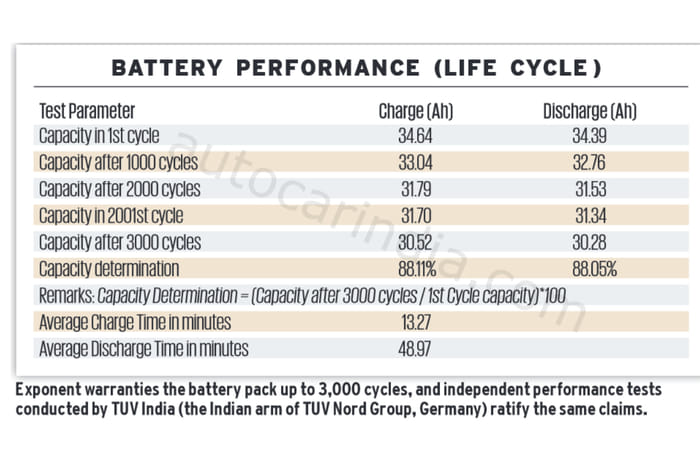Compared to an ICE vehicle, which can be refuelled in just a matter of minutes, a battery pack takes many hours (oftentimes an entire night) to be topped up. This has been one of the major hurdles in the widespread adoption of EVs, and Bengaluru-based startup, Exponent Energy, aims to solve exactly that.
With Exponent Energy’s proprietary fast-charging technology, which includes its proprietary battery management system and charger, it claims any vehicle can be fully charged in just 15 minutes.
The startup doesn’t make the cells in-house and brands itself as a ‘cell-agnostic full-stack power company’. This means instead of using specialised cells, it uses readily available LFP (Lithium Ferrous Phosphate) cells, and instead, the bulk of its tech is consolidated into the charging mechanism.
The big talking point is the incorporation of an HVAC (heating, ventilation and air-conditioning) system to keep the cells from overheating. How that works is the e^pump (what Exponent calls its charger) pumps in cold water (10 degrees Celsius) to the e^pack (Exponent-speak for its purpose-designed battery pack). This cools down the cells, and helps in prolonging their life and retaining their potency.

The HVAC system is a part of the stationary charger and not an on-board element of the battery. However, the battery pack is designed to enable the flow of cold water through it and back out through the charger, thus drawing the excess heat out of the pack. As of today, this technology only works with fixed chargers, and portable chargers are not an option.
And since the bulky and costly HVAC system is nestled within the e^pump, not the vehicle, the EV doesn’t gain a whole lot of extra weight and cost. The company claims that over 3,000 rapid charging cycles, its battery pack deteriorated by just 13 percent.
These claims have been substantiated in an independent study conducted by TUV India (Indian arm of TUV Nord Group, Germany), the results of which have been shared with us by Exponent (refer to table below). The only caveat is all these numbers are from tests conducted within a lab, and real-world numbers will take some time to arrive as the company has begun operations just a few months ago.
The company says that its technology stops the battery pack from degrading despite frequent rapid charging by balancing the supply of voltage through its proprietary software as well as circulation of cold water inside the battery pack to cool the cells down. Similar to a liquid-cooled engine, the battery pack has sealed channels for this cold water to run through it, which cool down the cells and keep them in the optimum operating range, between 25 to 35 degree Celsius, as per the company.
Speaking of Exponent’s charger, the cost of installation is on average Rs 8 lakh and the selling price is Rs 16 per unit of electricity. In rare scenarios (if underground cabling needs to be done, or the location lacks existing power), it can go up to Rs 10 lakh. In comparison, the average fast charger costs somewhere around Rs 7.60 lakh and the selling price is between Rs 22-24 per unit.

There are two sizes of chargers – intracity and intercity. We got to see the intracity charger in action as it topped up an 8kWh battery in an electric three-wheeler in just under 15 minutes. The ARAI-certified range for a three-wheeled vehicle powered by this battery pack is 98km, but the average real-world range figure is closer to 75km. Any vehicle using Exponent’s battery pack can also be charged at other charging stations, albeit at a much slower rate.
Currently, Exponent has 30 charging stations established in Bengaluru and of those, 20 of them are privately owned. It has plans to expand to Mumbai, Hyderabad, Ahmedabad, Delhi-NCR and Chennai in this calendar year. Commercial vehicles are the priority at the moment. The company states that its intercity battery pack and charger are under development and will be revealed on an electric bus soon.































